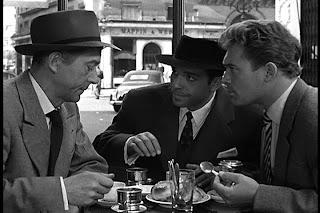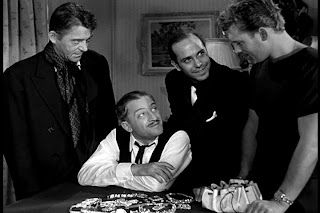 Released: April 13, 1955
Released: April 13, 1955a.k.a.: Du rififi chez les hommes
Director: Jules Dassin; Screenplay: Auguste le Breton, Jules Dassin and Rene Wheeler based on le Breton’s novel; Cinematography: Philippe Agostini; Music: Georges Auric; Producers: Henri Berard, Pierre Cabaud and Rene Wheeler; Studio: Pathé
Cast: Jean Servais (Tony le Stéphanois), Carl Möhner (Jo le Suedois), Robert Manuel (Mario Ferrati), Jules Dassin (Cesar le Milanais), Marie Sabouret (Mado les Grands Bras), Janine Darcey (Louise le Suedois), Claude Sylvain (Ida Ferrati), Marcel Lupovici (Pierre Grutter), Pierre Grasset (Louis Grutter/Louis le Tatoué), Robert Hossein (Remi Grutter), Magali Noël (Viviane), Dominique Maurin (Tonio le Suedois)
- “I liked you, Macaroni, but you know the rules…”
In the long line of great heist films – one of which have appeared just two days ago – one of the most common nominees as the best of them all is this French noir from expatriate director Jules Dassin. But to pigeonhole it with such a designation is to overlook the true scope of this amazing film. The jewel heist definitely serves as the centerpiece of the story, but it is only an action-starter that allows Dassin to explore themes that he so often examined – the ideas of the strong bonds of friendship, honor among thieves, and, even more powerfully considering the course of Dassin’s own life, deception and double-crossing. The trials and tribulations of Dassin have already been discussed in previous entries for his films in this series, but it is worth pointing out that his experiences with HUAC and being chased from the United States still appear to have been a major influence on his work in 1955. I am not arguing that they served as a direct inspiration for a movie like Rififi, but the same darkness and cynicism that became even more apparent in his work when he first left the United States remained at the fore in making this film.

The protagonist of the film is Tony le Stéphanois (Jean Servais), a career hoodlum recently released from prison after serving five years. His longtime partner Jo (Carl Möhner) and associate Mario (Robert Manuel) approach him with a plan for a major jewelry heist. Tony at first rebuffs the offer, saying they could never pull it off. Later that same night he goes to see his former girlfriend Mado (Marie Sabouret), who has taken up with rival gangster and nightclub owner Pierre Grutter (Marcel Lupvici), and after a violent confrontation with her Tony changes his mind about the robbery. But he argues that rather than just taking the jewels in front displays, the gang should break in and hit the central safe. Concocting an even more elaborate plan, and bringing in safe specialist Cesar le Milanais (Jules Dassin), leads to one of the great on-screen robberies ever filmed. The robbery goes well, but the aftermath is a disaster for all involved. Tony’s rival Grutter learns that the gang was behind the sensational robbery and sees an opportunity to make off with the loot himself. Kidnapping Jo’s five-year old son, they hold him for ransom and demand that the jewels be turned over to them. Tony and Jo thus begin scrambling to find a way to save the boy and their score.
The central heist sequence is rightly celebrated for the skill with which it is filmed. For nearly a half-hour, Dassin utilizes almost no dialog and just sets the camera in places to watch the thieves work. It is satisfying to watch, because for the forty minutes leading up to this point, the audience has watched all of the preparation and planning that went into the robbery. It sounds bizarre to call it “satisfying” to watch hoodlums pull off an elaborate robbery, but it really is. Perhaps the satisfaction is derived from the realization that Dassin is keeping you enthralled for such a long stretch without any unnecessary dialog or tricks. And the silence makes the entire sequence so incredibly intense, it is impossible not to be on the edge your seat the entire time. Since you have seen the planning, you know what they intend to do. But having it come off without a hitch is another animal entirely. So when the men look at each other nervously as they try to silence the alarm or dig through the ceiling, you as the viewer are just as on edge.

With all that being said, it isn’t the heist scene that keeps me coming back to this film. That sequence never fails to impress me, but it’s not something that I would necessarily watch on a continual basis for sheer enjoyment. What engages me most about the story is the code by which these men live by. The underworld code is something that is almost more important to a man like Tony than is life itself. It is a world where partners are supposed to look out for each other. If one hood can help another, he should, even if that means taking the rap. Those that are arrested must keep their mouths shut, no matter what. And the penalties for breaking any of these tenets are severe. The sense of brotherhood and camaraderie that exists among those that share this distorted set of ethics like Tony, Jo, Mario and Cesar, is what makes the story so compelling. They all know the rules – paraphrasing what Hyman Roth would famously say twenty years later, this is the life they chose. Still, there is great drama in seeing a scene like the one in which Cesar, having ratted out his partners after being tortured by Grutter, apologizes to Tony for succumbing to the pressure. Tony nods, understanding, but knows that he has to avenge the betrayal. Equally as memorable is the scene when Mario and his wife are tied up and interrogated by Pierre and his henchman. The sudden change of heart from Mario's wife is unforgettable.

Rififi looks and feels precisely how a film noir should and it remains my favorite film in the illustrious career of Jules Dassin.


Wow Dave I didn't think this film would make the list. I've never considered this one noir. I can't believe one of the 10 films me and Quirky mentioned won't make the top 100!!!! In an earlier post I said Brute Force was Dassin's 2nd best movie. I completely forgot about this one. After Night And The City this is his greatest movie. It's an utter masterpiece. I just look at this as more of a pure heist flick. I know that They Shoot Pictures also doesn't consider this film noir. I guess you will leave out Sunset Boulevard or Night Of The Hunter because they are more borderline noir with gothic overtones. Though both would make my top ten American films ever. Either way this movie is perfect and the tension is overbearingly amazing. Dassin was just making celluloid perfection almost every time out during this period. This film was the culmination of his extraordinary talent......M.Roca
ReplyDeleteRififi has to be the greatest French film noir of the 50’s. Dassin has Paris in deep focus. An excellent cast and sexy night-club interlude culminating in the terrific final scenes of a car desperately careening through the streets of Paris, make an absorbing and sobering thriller. The whole action is underpinned by an evocative and hip jazz score.
ReplyDeleteThe best line in the movie is given to Mario's wife after her son is kidnapped, when in her anger and angst she calmly confronts Mario with these words:
"There are kids… millions of kids who have grown up poor. Like you. How did it happen… What was the difference between you and them that you became a hood, a tough guy, and not them?
Know what I think Jo, they’re the tough guys, not you."
This is the real Dassin speaking...
What a film ! What a great blog !!
ReplyDeleteM.Roca - I think it is easily a noir. If you consider The Asphalt Jungle and The Killing noir, then I don't see how Rififi could not be one as well. Also, the thing about the They Shoot Pictures noir list is that they do not include any non-English speaking films, so this one never had a shot there. But, I love hearing that this is a great movie in your opinion as well. This is such a powerful, impressive film.
ReplyDeleteTony - I think you mean "The best line in the movie is given to Jo's wife..." but I get what you're saying and agree that it is powerful stuff.
Rob J - Thanks for the compliment! This is definitely an all-time classic.
"The jewel heist definitely serves as the centerpiece of the story, but it is only an action-starter that allows Dassin to explore themes that he so often examined – the ideas of the strong bonds of friendship, honor among thieves, and, even more powerfully considering the course of Dassin’s own life, deception and double-crossing."
ReplyDeleteExcellent point there Dave, in a stellar review for the third heist film in a row on the countdown, following THE ASPHALT JUNGLE and THE KILLING. It's a very close call with the Kubrick film for me (Huston's for all intents and purposes is right there too) but I agree with you that Monsieur Dassin's film is narrowly the best of the three, hence it's placement here is perfect. I agree with Maurizio Roca that it's Dassin's second-best film behind NIGHT IN THE CITY, but we're taking semantics here. I think most people are on your side anyway Dave.
The 30 minute heist sequence is a model of its kind, one of the cinema's greatest segment sin any genre. It first appears that these guys are amateurs, but their use of unconventional items like umbrellas and fire extinguishers show they have studied the situation perfectly, and excercise coordinated teamwork. The killings in this film are terrifying, the sexual underpinning palpable and the use of Paris locations as compelling as the use of London was in NIGHT AND THE CITY. Phillipe Agostini's photography is masterly.
Dave, I'm completely with you on this one! I had the good fortune of seeing it on the big screen in Los Angeles about ten years ago and was completely blown away. Great write-up and great pick.
ReplyDeleteI guess I agree with They Shoot Pictures in that I don't consider non-english speaking films as noir. I also personally don't view any movie made in color as film noir either. My definition might be stricter with the above elements plus the timeline of 1941-58. I lump everything that doesn't fit those criteria's into something else like neo noir or just crime drama etc........M.Roca
ReplyDeleteI have wanted to see this film for a long time, but it's not available in my country in French, only a dubbed version. And I def. do not want to see a dubbed version. I rarely watch European movies, but def. would like to make an exception for this one -- 'cos of Dassin, of course, and 'cos I read how wonderful it is as a noir.
ReplyDeleteQuirky: You do love Eisenstein, Pudovkin, Dovzsenko and Tarkovsky though, no?
ReplyDeleteTo Mr. Juliano: No, I hate Russian cinema. And literature.
ReplyDeleteI did a remake of the heist scene, day before with my film crew, just to get inside the skin of the director.
ReplyDeleteHere's the link:
http://www.youtube.com/watch?v=F6FC6hGNMmg